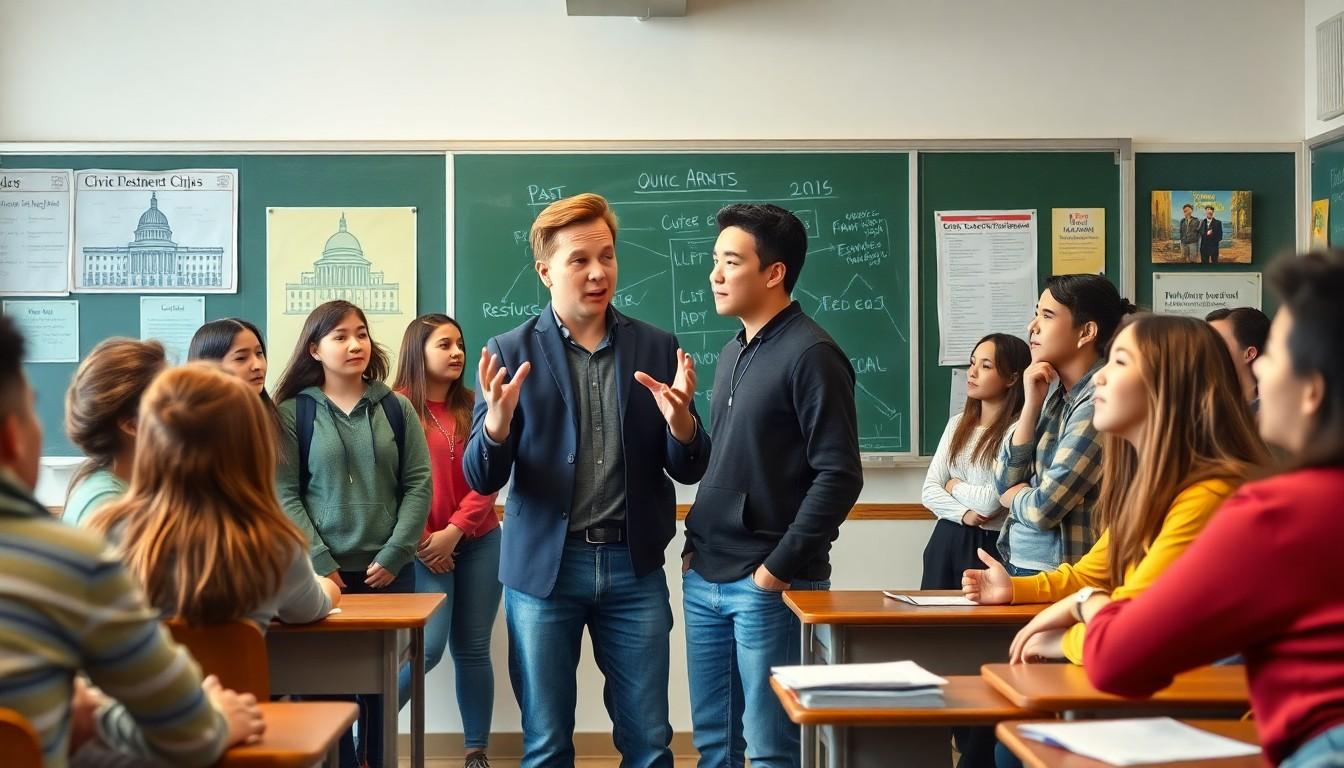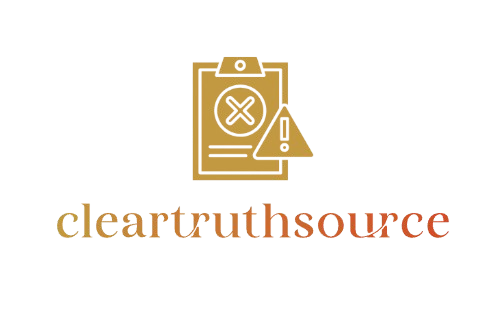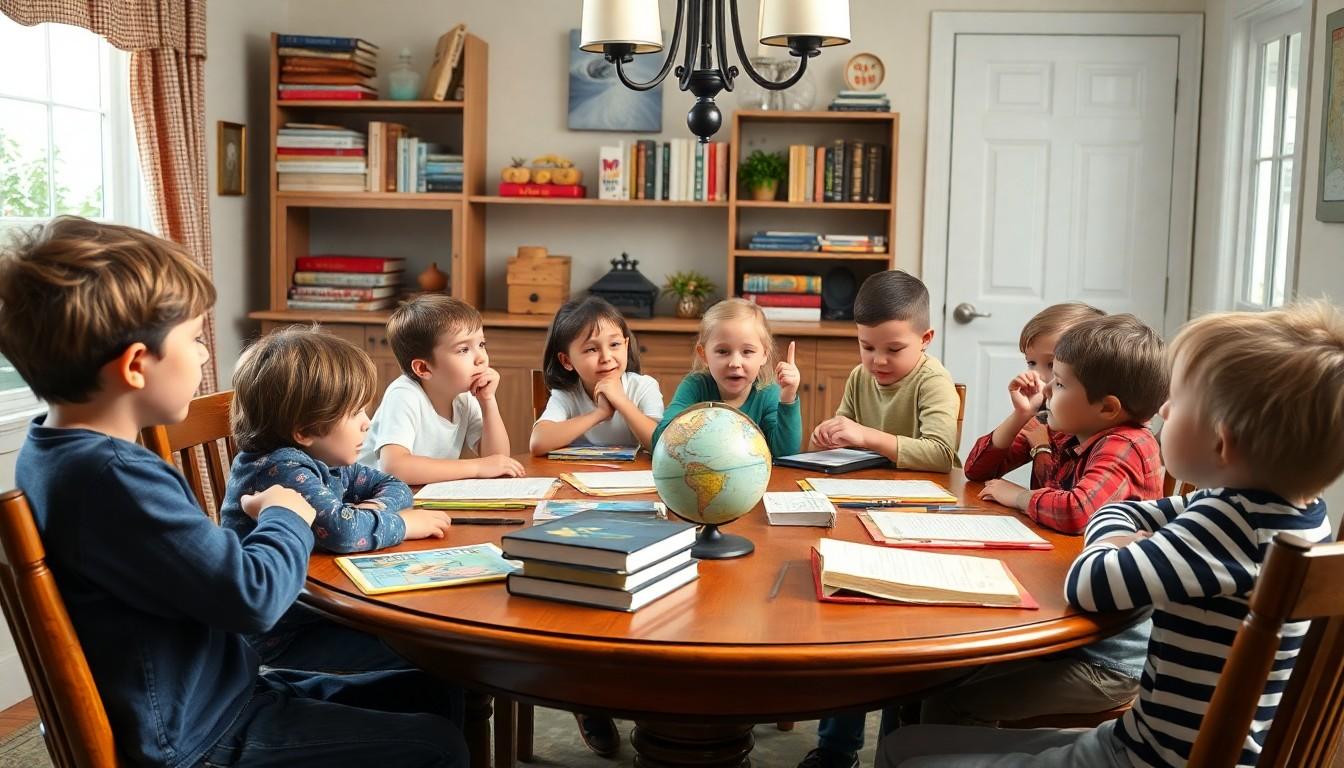Political socialization is like the secret sauce that flavors our views on government, society, and everything in between. But when does this fascinating process actually kick off? Spoiler alert: it’s not just when someone yells “vote!” at you from a soapbox. It starts much earlier, often before kids even know what a ballot is.
From family dinner debates to playground politics, influences shape opinions in ways that are often sneaky and subtle. Understanding when and how this process unfolds can reveal why people align with certain ideologies or parties. So let’s dive into the quirky world of political socialization and uncover the moments that spark our journey into the realm of civic engagement. Who knew that learning about politics could be as entertaining as a game of dodgeball?
Understanding Political Socialization
Political socialization encompasses the lifelong process through which individuals develop their political beliefs and values. Beginning in early childhood, family plays a pivotal role, as children absorb political opinions from discussions at home. Observing parents’ and guardians’ reactions to current events contributes significantly to shaping political outlooks.
Influence extends beyond family. Schools serve as another crucial environment where political ideas are introduced. Through classroom discussions and civic education programs, educators help students grasp fundamental political concepts. This education often sparks curiosity and encourages further exploration of political systems.
Peers also impact political beliefs. Social interactions among friends contribute to refining opinions and attitudes. Engaging in discussions on political topics can reinforce views or challenge existing beliefs, prompting deeper reflection.
Media serves as a powerful tool for political socialization. News outlets, social media platforms, and online content shape perceptions of political issues. Exposure to diverse viewpoints through various media channels helps individuals formulate their political identities.
Significant events in society act as catalysts for political socialization. Major elections, social movements, and national crises evoke interest and participation in civic matters. Experiencing these events firsthand can motivate individuals to engage more deeply with political processes.
Political socialization begins early and develops through family, education, peers, media, and significant societal events. Each influence adds layers to an individual’s understanding of politics and civic responsibility.
Stages of Political Socialization

Political socialization occurs in distinct stages, influencing individuals from early childhood through adulthood. Each stage presents unique factors that shape political beliefs and values.
Childhood Influences
In early childhood, family dynamics significantly affect political views. Children’s beliefs often mirror those of their parents, especially through discussions at home about current events. Observations of familial responses to political issues also contribute to their understanding of societal norms. Toys and media targeted at young audiences can subtly introduce political themes, creating a foundational awareness. Initiating conversations about civic responsibility nurtures curiosity and paves the way for future engagement.
Adolescent Development
During adolescence, peer influence becomes more pronounced. Teenagers start forming their identities, which includes exploring political perspectives outside their family. School plays a crucial role during this period, offering structured learning about government, rights, and responsibilities. Extracurricular activities, such as debate clubs or student government, encourage participation and foster critical thinking about political matters. Social interactions also expose adolescents to differing opinions, challenging preconceived notions and enhancing their analytical skills.
Adult Political Socialization
Adulthood brings further refinement of political beliefs. Significant life events, such as employment, marriage, and parenthood, can shift perspectives toward civic duties. Active participation in community organizations and political discussions fosters deeper understanding and engagement. Media consumption evolves as adults seek diverse viewpoints, solidifying or reshaping opinions. Major political events, like elections or social movements, often serve as catalysts for increased involvement in political processes, reinforcing the value of civic engagement.
Factors That Impact Political Socialization
Political socialization occurs through various influences and environments that shape political beliefs from early childhood. Family, educational institutions, and media play significant roles in this complex process.
Family Influence
Family serves as the first source of political information. Children observe and absorb their parents’ attitudes toward political events, contributing to their foundational beliefs. Family discussions around the dinner table can plant the seeds for future ideological alignment. Observing emotional responses to news fosters understanding of political nuances. As children grow, they often model family behaviors and beliefs, reinforcing political socialization at home.
Educational Institutions
Schools act as essential environments for civic education. Through formal curricula and classroom discussions, students learn about government functions and civic responsibilities. Teachers provide structured guidance, promoting curiosity and critical thinking about political issues. Extracurricular activities, such as debate clubs or student governments, enhance engagement by fostering active participation in politics. These experiences equip students with the knowledge to navigate political landscapes effectively.
Media’s Role
Media acts as a powerful influence on political perceptions. It exposes individuals to diverse perspectives and facilitates discussions around current events. News outlets, social media, and online platforms shape understandings of political issues and can sway opinions. Choices in media consumption directly impact political awareness and attitudes. Engaging with varied sources fosters critical analysis and encourages informed civic engagement.
The Importance of Early Political Socialization
Early political socialization holds significant weight in shaping an individual’s worldview. It starts in childhood, with family discussions acting as the primary source of political knowledge. Children absorb their parents’ beliefs and reactions to political events, solidifying their foundational views on governance and society.
Schools further the political learning experience. They introduce formal education on political structures and civic responsibilities. Critical thinking flourishes in classroom environments where teachers encourage debates and discussions on current issues. Participating in extracurricular activities, such as student government, cultivates engagement and practical understanding of politics.
Peer interactions also contribute to political socialization. Friends can reinforce or challenge existing beliefs, creating a dynamic environment for political discourse. These conversations enable individuals to test and refine their views while navigating societal expectations.
Media plays a crucial role in shaping political awareness. Exposure to various perspectives helps individuals form informed opinions. Engaging with news outlets, social media platforms, and political commentary broadens one’s understanding of complex issues. Significant societal events, like elections and movements, often stimulate interest and participation in civic activities.
As political socialization evolves, distinct phases emerge throughout a person’s life. Though family influences dominate early on, adolescents experience a shift where peers and schools take precedence. During adulthood, life events and community involvement further refine political beliefs. Overall, the impact of early political socialization lays the groundwork for informed citizenship, emphasizing the importance of continued engagement throughout life.
Conclusion
Political socialization is an essential journey that begins in early childhood and continues throughout life. The influences of family, schools, peers, and media create a rich tapestry of experiences that shape an individual’s political beliefs and values. Recognizing the early stages of this process highlights the importance of nurturing informed discussions and critical thinking from a young age. As individuals navigate their political landscapes, the foundation laid during childhood plays a crucial role in fostering engaged and responsible citizens. Embracing this lifelong learning can lead to a deeper understanding of civic responsibilities and a more active role in shaping society.

